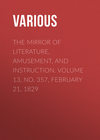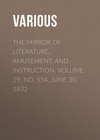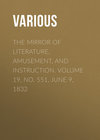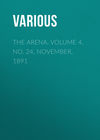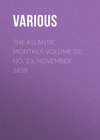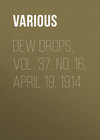Loe raamatut: «The Mirror of Literature, Amusement, and Instruction. Volume 13, No. 357, February 21, 1829», lehekülg 5
Thus far goes the public history; now let us turn to the private memoranda. In 1690, the parish, being very loyal, gave a grand display of fire-works on the happy return of William the Third from Ireland; and in the parish books appear the following entries on the subject, which will give some idea of the moderate charges of parish festivities in those "dark ages."

Making a grand total of £4. 1s. 0d. for a St. Paul's parish fête; but this was in 1690. This festival was of sufficient note to engage the artist's attention, and an engraving of it was sold by "B. Lens, between Bridewell and Fleet Bridge in Blackfryers."
Convent Garden has been the abode of talented and noble men. Richardson's Hotel was the residence of Dr. Hunter, the anatomical lecturer; and in 1724, Sir James Thornhill, who painted the dome of St. Paul's Cathedral, resided in this garden and opened a school for drawing in his house. Moreover, for the honour of the Garden, be it known, that at Sir Francis Kynaston's house therein situated, Charles the First established an academy called "Museum Minervæ," for the instruction of gentlemen in arts and sciences, knowledge of medals, antiquities, painting, architecture, and foreign languages. Not a vestige remains of the museum establishment now-a-days, or the subjects it embraced, unless it be foreign languages, including wild Irish, and very low English. Even as late as 1722, Lord Ferrers lived in Convent Garden; but this is trifling compared with the list of nobles who have lived around about this attractive spot, where nuns wandered in cloistered innocence, and now, oh! for sentimentality, what a relief to a fine, sensitive mind, or a sickly milliner!
In the front of the church quacks used to harangue the mob and give advice gratis. Westminster elections are held also on the same spot—that's a coincidence.
A CORRESPONDENT.
Manners & Customs of all Nations
AFRICAN FESTIVITIES
At Yourriba Captain Clapperton was invited to theatrical entertainments, quite as amusing, and almost as refined as any which his celestial Majesty can command to be exhibited before a foreign ambassador. The king of Yourriba made a point of our traveller staying to witness these entertainments. They were exhibited in the king's park, in a square space, surrounded by clumps of trees. The first performance was that of a number of men dancing and tumbling about in sacks, having their heads fantastically decorated with strips of rags, damask silk, and cotton of variegated colours; and they performed to admiration. The second exhibition was hunting the boa snake, by the men in the sacks. The huge snake, it seems, went through the motions of this kind of reptile, "in a very natural manner, though it appeared to be rather full in the belly, opening and shutting its mouth in the most natural manner imaginable." A running fight ensued, which lasted some time, till at length the chief of the bag-men contrived to scotch his tail with a tremendous sword, when he gasped, twisted up, seemed in great torture, endeavouring to bite his assailants, who hoisted him on their shoulders, and bore him off in triumph. The festivities of the day concluded with the exhibition of the white devil, which had the appearance of a human figure in white wax, looking miserably thin and as if starved with cold, taking snuff, rubbing his hands, treading the ground as if tender-footed, and evidently meant to burlesque and ridicule a white man, while his sable majesty frequently appealed to Clapperton whether it was not well performed. After this the king's women sang in chorus, and were accompanied by the whole crowd.
The price of a slave at Jannah, as nearly as can be calculated, is from 3l. to 4l. sterling; their domestic slaves, however, are never sold, except for misconduct.
AFRICAN WIDOW
Capt. Clapperton tells of a widow's arrival in town, with a drummer beating before her, whose cap was bedecked with ostrich feathers; a bowman walking on foot at the head of her horse; a train behind, armed with bows, swords, and spears. She rode a-straddle on a fine horse, whose trappings were of the first order for this country. The head of the horse was ornamented with brass plates, the neck with brass bells, and charms sewed in various coloured leather, such as red, green, and yellow; a scarlet breast-piece, with a brass plate in the centre; scarlet saddle-cloth, trimmed with lace. She was dressed in red silk trousers, and red morocco boots; on her head a white turban, and over her shoulders a mantle of silk and gold. Had she been somewhat younger and less corpulent, there might have been great temptation to head her party, for she had certainly been a very handsome woman, and such as would have been thought a beauty in any country in Europe.
AFRICAN NURSE
She was of a dark copper colour. In dress and countenance, very like one of Captain Lyon's female Esquimaux. She was mounted on a long-backed bright bay horse, with a scraggy tale, crop-eared, and the mane as if the rats had eaten part of it; and he was not in high condition. She rode a-straddle; had on a conical straw dish-cover for a hat, or to shade her face from the sun, a short, dirty, white bedgown, a pair of dirty, white, loose and wide trousers, a pair of Houssa boots, which are wide, and came up over the knee, fastened with a string round the waist. She had also a whip and spurs. At her saddle-bow hung about half a dozen gourds, filled with water, and a brass basin to drink out of; and with this she supplied the wounded and the thirsty. I certainly was much obliged to her, for she twice gave me a basin of water. The heat and the dust made thirst almost intolerable —Clapperton's Travels.
SPIRIT OF THE PUBLIC JOURNALS
THE BOXES
(To the Editor of Blackwood's Magazine.)
Sir,—In the course of my study in the English language, which I made now for three years, I always read your periodically, and now think myself capable to write at your Magazin. I love always the modesty, or you shall have a letter of me very long time past. But, never mind, I would well tell you, that I am come to this country to instruct me in the manners, the customs, the habits, the policies, and the other affairs general of Great Britain. And truly I think me good fortunate, being received in many families, so as I can to speak your language now with so much facility as the French.
But, never mind. That what I would you say, is not only for the Englishes, but for the strangers, who come at your country from all the other kingdoms, polite and instructed; because, as they tell me, that they are abonnements10 for you in all the kingdoms in Europe, so well as in the Orientals and Occidentals.
No, sir, upon my honour, I am not egotist. I not proud myself with chateaux en Espagne. I am but a particular gentleman, come here for that what I said; but, since I learn to comprehend the language, I discover that I am become an object of pleasantry, and for himself to mock, to one of your comedians even before I put my foot upon the ground at Douvres. He was Mr. Mathew, who tell of some contretems of me and your word detestable Box. Well, never mind. I know at present how it happen, because I see him since in some parties and dinners; and he confess he love much to go travel and mix himself altogether up with the stage-coach and vapouring11 boat for fun, what he bring at his theatre.
Well, never mind. He see me, perhaps, to ask a question in the paque-bot—but he not confess after, that he goed and bribe the garçon at the hotel and the coach man to mystify me with all the boxes; but, very well, I shall tell you how it arrived, so as you shall see that it was impossible that a stranger could miss to be perplexed, and to advertise the travellers what will come after, that they shall converse with the gentlemen and not with the badinstructs.
But, it must that I begin. I am a gentleman, and my goods are in the public rentes,12 and a chateau with a handsome propriety on the bank of the Loire, which I lend to a merchant English, who pay me very well in London for my expenses. Very well. I like the peace, nevertheless that I was force, at other time, to go to war with Napoleon. But it is passed. So I come to Paris in my proper post-chaise, where I selled him, and hire one, for almost nothing at all, for bring me to Calais all alone, because I will not bring my valet to speak French here where all the world is ignorant.
The morning following I get upon the vapouring boat to walk so far as Douvres. It was fine day—and, after I am recover myself of a malady of the sea, I walk myself about the shep, and I see a great mechanic of wood, with iron wheel, and thing to push up inside, and handle to turn. It seemed to be ingenuous, and proper to hoist great burdens. They use it for shoving the timber, what come down of the vessel, into the place; and they tell me it was call "Jaques in the box;" and I was very much please with the invention so novel.
Very well. I go again promenade upon the board of the vessel, and I look at the compass, and little boy sailor come and sit him down, and begin to chatter like the little monkey. Then the man what turns a wheel about and about laugh, and say, "Very well, Jaques;" but I not understand one word the little fellow say. So I make inquire, and they tell me he was "Box the compass." I was surprise, but I tell myself, "Well, never mind;" and so we arrived at Douvres. I find myself enough well in the hotel, but as there has been no table d'hote, I ask for some dinner, and it was long time I wait; and so I walk myself to the customary house, and give the key to my portmanteau to the Douaniers, or excisemen, as you call, for them to see as I had not no snuggles in my equipage. Very well—I return at my hotel, and meet one of the waiters, who tell me, (after I stand little moment to the door to see the world what pass by upon a coach at the instant,) "Sir," he say, "your dinner is ready."—"Very well," I make response, "where, was it?"—"This way, sir," he answer; "I have put it in a box in the café room."—"Well—never mind," I say to myself; "when a man himself finds in a stranger country, he must be never surprised. 'Nil admirari.' Keep the eyes opened, and stare at nothing at all."
I found my dinner only there there,13 because I was so soon come from France; but, I learn, another sort of the box was a partition and table particular in a saloon, and I keep there when I eated some good sole fritted, and some not cooked mutton cutlet; and a gentleman what was put in another box, perhaps Mr. Mathew, because nobody not can know him twice, like a cameleon he is, call for the "pepper box." Very well. I take a cup of coffee, and then all my hards and portmanteau come with a wheelbarrow; and, because it was my intention to voyage up at London with the coach, and I find my many little things was not convenient, I ask the waiter where I might buy a night sack, or get them tie up all together in a burden. He was well attentive at my cares, and responded, that he shall find me a box to put them all into. Well, I say nothing to all but "Yes," for fear to discover my ignorance; so he bring the little box for the clothes and things into the great box what I was put into; and he did my affairs in it very well. Then I ask him for some spectacle in the town, and he send boot-boy with me so far as the Theatre, and I go in to pay. It was shabby poor little place, but the man what set to have the money, when I say "how much," asked me if I would not go into the boxes. "Very well," I say, "never mind—oh yes—to be sure;" and I find very soon the box was the loge, same thing. I had not understanding sufficient in your tongue then to comprehend all what I hear—only one poor maiger doctor, what had been to give his physic too long time at a cavalier old man, was condemned to swallow up a whole box of his proper pills. "Very well," I say, "that must be egregious. It is cannot be possible;" but they bring little a box, not more grand nor my thumb. It seem to be to me very ridiculous; so I returned to my hotel at despair how I could possibility learn a language what meant so many differents in one word.
I found the same waiter, who, so soon as I come in, tell me, "Sir, did you not say that you would go by the coach to-morrow morning?" I replied, "Yes—and I have bespeaked a seat out of the side, because I shall wish to amuse myself with the country, and you have no cabriolets14 in your coaches."—"Sir," he say, very polite, "if you shall allow me, I would recommend you the box, and then the coachman shall tell every thing."—"Very well," I reply, "yes—to be sure—I shall have a box then—yes;" and then I demanded a fire into my chamber, because I think myself enrhumed upon the sea, and the maid of the chamber come to send me in bed;—but I say, "No so quick, if you please; I will write to some friend how I find myself in England. Very well—here is the fire, but perhaps it shall go out before I have finish." She was pretty laughing young woman, and say, "Oh no, sir, if you pull the bell, the porter, who sit up all night, will come, unless you like to attend to it yourself, and then you will find the coal-box in the closet."—Well—I say nothing but "Yes—oh yes." But, when she is gone, I look direct into the closet, and see a box not no more like none of the other boxes what I see all day than nothing.
